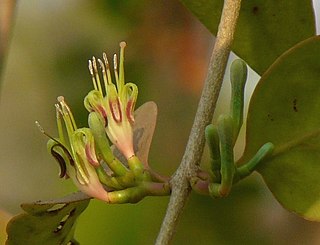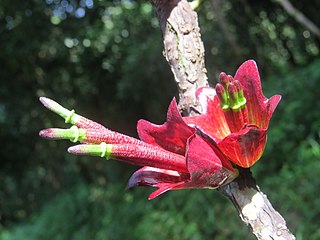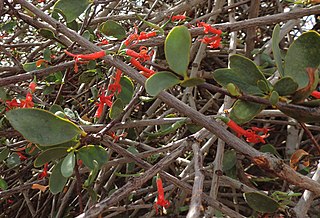
Tapinanthus is a genus of mistletoe in the family Loranthaceae, native to Africa. The name of the genus is derived from the Greek tapeinos meaning "low" or "humble" and anthos meaning flower.

Amyema is a genus of semi-parasitic shrubs (mistletoes) which occur in Malesia and Australia.

Korthalsella is a genus of flowering plants in the sandalwood family, Santalaceae. It contains about 25 species distributed in Asia, Africa, Australia, New Zealand, and some Pacific Islands.

Dendrophthoe is a genus of hemiparasitic shrubs found in Asia and Australia known as mistletoes. The genus was described by German naturalist Carl Friedrich Philipp von Martius in 1830. Species in this genus have a variety of reported uses in the medical traditions of the region, most notably in Nepal.

Agelanthus is a genus of Afrotropical plants in family Loranthaceae. They grow in trees, including Acacia and Combretum species, as hemiparasitic shrubs of varying sizes. The host plant is penetrated by a single haustorium, and the stems typically have swollen, flower-producing nodes. The flowers are often closely clustered (fascicled) with the five petals (pentamerous) fused into a tube (gamopetalous). The flower may have a swollen base and the tubes open along unilateral, V-shaped splits. The filaments remain spirally rolled inward when the flowers open, while the styles are inconspicuous, slender filaments that are somewhat thickened in the middle. Berries range from pink to orange and red in colour, and are around 1 cm in diameter.

Taxillus is a plant genus in the mistletoe family: Loranthaceae.

Macrosolen is a genus of plants in the family Loranthaceae. It includes about 83 species all over the world with ca. 40 species widely distributed in tropical South and Southeast Asia. Some species were described by de Loureiro, Lecomte, Danser (1938) and Hô (2003).
Oliverella is a genus of flowering plants belonging to the family Loranthaceae.

Tolypanthus is a genus of plants in the family Loranthaceae.
Dactyliophora is a genus of flowering plants belonging to the family Loranthaceae.
Erianthemum is a genus of flowering plants belonging to the family Loranthaceae.
Lepeostegeres is a genus of flowering plants belonging to the family Loranthaceae.
Oncocalyx is a genus of flowering plants belonging to the family Loranthaceae.
Englerina is a genus of flowering plants belonging to the family Loranthaceae.
Globimetula is a genus of flowering plants belonging to the family Loranthaceae.
Lepidaria is a genus of flowering plants belonging to the family Loranthaceae.
Oedina is a genus of flowering plants belonging to the family Loranthaceae.
Oncella is a genus of flowering plants belonging to the family Loranthaceae.

Plicosepalus acaciae, the acacia strap flower, is a species of hemiparasitic flowering plant in the family Loranthaceae. It is native to northeastern Africa, the Levant, and the Arabian Peninsula. As its common and scientific names suggest, it parasitizes acacias; Vachellia tortilis subsp. raddiana and V. t. subsp. tortilis. It seeds are dispersed by the white-spectacled bulbul.









